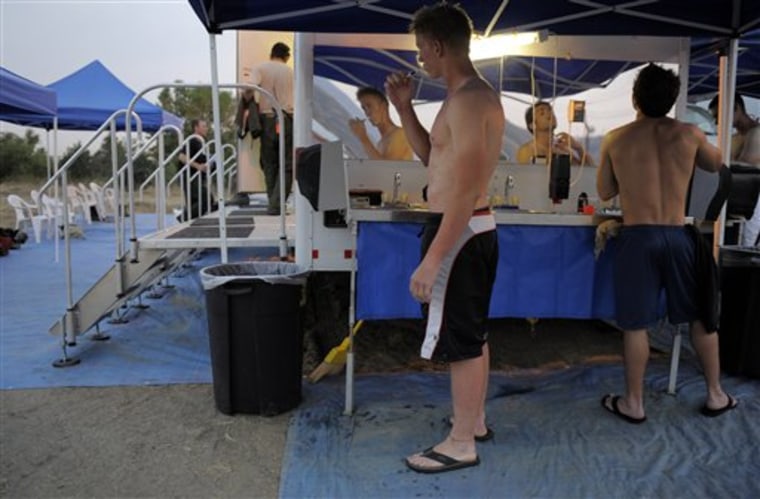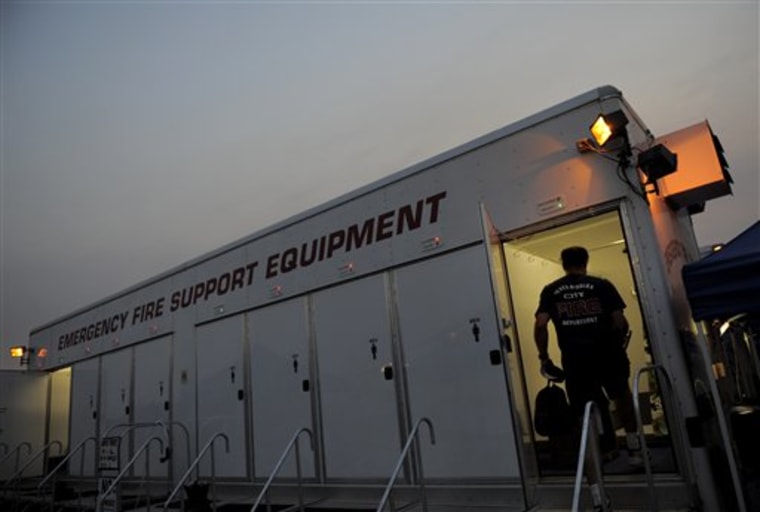"Good morning!" Capt. Chip Paulson shouts from the canvas deck chair beside his fire engine. Never mind that it's just shy of 4 p.m.
With smoke from wildfires turning day into night, flame burning night into day, the Escondido firefighter figures he might as well call it morning. And at the massive incident base camp outside Los Angeles, half the population is always beginning another long day of fighting fire.
Clinging to the sere foothills overlooking the massive Hansen Dam, the camp is a military-style bivouac whose itinerant residents are battling back the flames from the largest wildfire that has ever threatened the "City of Angels."
"This is a city," U.S. Forest Service spokeswoman Barbara Rebiskie says as she looks out over the mass of trailers and the clusters of dome tents that have sprouted like mushrooms on the soccer and baseball fields above the dam. "It's like you watch it grow overnight."
There are 4,700 people working the Los Angeles fires, with crews from as far away as Canada and New Mexico. And every one of them has to be paid, fed, showered
On the main street of the camp, trailers line the tarmac like concessions on a carnival midway. There's one for timesheets, another for equipment check-out, and others for communications, logistics and emergency medical care.
"You name it," says Rebiskie, "it's here."
In the 100-degree heat, the stew of odors from diesel fuel, portable toilets, frying meat and burning wood is almost overpowering at times. In some places, the carbon monoxide from idling vehicles was so thick that the Department of Health cordoned off areas with police tape.
In the dirt parking lot where the crews park their engines, tankers rumble up and down spraying water in a seemingly futile effort to keep down the dust. But life at the camp is far from spartan.
Bunks inside trailers
Beyond the truck area, 16 tractor trailers idle 24 hours a day. Inside each trailer, two rows of bunks stacked three high can accommodate 42 people in air-conditioned splendor.
With their black lights and carpeted walls, it's almost possible to forget the fires raging nearby.
"Once you get in there, you don't know whether it's night or day," says the mustachioed Paulson. "We get a good solid six hours of real sleep inside of there."
Nearby, two trailers house a couple dozen spacious shower stalls — the men's curtains adorned with toucans and parrots, the women's with buttercups and cosmos. A nearby hydrant supplies 50 pounds per square inch of water pressure, and the units can heat that water to a scalding 113 degrees Fahrenheit.
"They're taking all cold ones right now," laughs shower attendant Jason Hammons.
As he stands by a sink outside one of the showers, shaving cream still clinging to his ear lobes, firefighter Kenny Kelley from San Bernardino says he's worked many blazes where personal hygiene was a toothbrush and a bottle of water out in the woods.
"It's definitely good to show up to," says Kelley, 24, a college student, his bare chest and arms revealing a nasty case of poison oak. "It's not home, obviously, but it's somewhat close."
Across the camp, another white trailer contains 10 washers and dryers that run 24 hours a day. A sign outside reads: "Please unroll socks & empty pockets & leave the rest to us!"
3,000 pounds to wash each day
Manager Duane Burden says he's using 6,000 gallons of water and 50 pounds of detergent a day to do 3,000 pounds of wash.
Twenty-four hours after dropping off his laundry, San Diego-based firefighter Chris Miller walked away from the trailer with a hot cup of coffee in one hand, a white bag of clean clothes in the other and a smile on his tanned face.
"As soon as you go on the line, it's pretty much the way it was when you brought it in," he says. "It's still nice having clean socks on when you wake up."

Nearby, men and women line up for chow. Fifteen minutes before serving time, the line is more than 100 deep, the blues and reds of the firefighters' uniforms interspersed with the greens of forestry workers and the bright orange of the more than 200 state inmates helping to fight the fires.
This night, the menu includes steak, baked potatoes, broccoli and cauliflower with cheese, garlic bread, carrot cake and tropical fruit. Because of the shifts, a freshly showered crew is always being replaced at table by another soot-smudged one straight from the fire lines.
After they've finished feeding their bodies, there's even a place on site where the firefighters can nourish their souls.
Down by the inmate quarter, "Chaplain Will" Steere has pitched a large tent beside his Winnebago Vector and equipped it with 50 folding chairs. The 77-year-old former tour company owner used to guide people to the homes of Hollywood stars, but since 1991 he's been traveling from wildfire to wildfire, offering spiritual comfort to a group he thought deserved it.
"They're looking at hell all day," he says. "And I'm showing them a way out of hell."
From Baghdad to base camp
Throughout the day, helicopters circle constantly overhead. The whirring blades make Susan Al Wardi homesick for Iraq.
Al Wardi, 22, worked four years as a translator for U.S. security forces in Baghdad's "Green Zone." She immigrated a year ago Saturday, but it was nine months before she was able to find a minimum-wage job with the California Conservation Corps — a youth development organization whose members are policing the base camp, filling ice chests and performing other odd chores.
Despite the humidity, 16-hour days and sleeping in a tent on the hard ground, Al Wardi is happy to be here and to be employed.
"I like to do hard work," she says, her dark eyes smiling beneath her blue cap. "I either want to become a lawyer or a nurse."
At 6 a.m. and 6 p.m., the crews gather in a clearing near the mess hall for their pre-shift briefing. They cluster around a plywood stage festooned with giant topographical maps of the surrounding hills.
On Friday morning, a private memorial service was held for the two firefighters who died Sunday. Beside the briefing stage, a shovel, fire rake and ax were lashed together between two enwreathed photographs of the dead firemen, and a flag was placed at half staff.
Warning against energy drinks
Despite signs everywhere warning the fatigued smoke eaters not to pound energy drinks, Medical Unit Leader Keith Douglass feels the need to repeat the admonition at the briefing.
"They REALLY dehydrate you," he shouts. "And if you get too dehydrated, you may end up in the hospital for a long while. And, believe me, you won't like the food over there."
With the help of high humidity and low winds, the crews have managed to contain about half the fires. Deputy Incident Commander Carlton Joseph says this isn't the time to let up.
"This is an opportunity to really jump on it and put it to bed," he says.
Most of these firefighters are used to staging from remote locations. This is the closest such a large fire has gotten to Los Angeles.
But at the end of a long day hacking fire breaks and dousing hot spots, Paulson says the last thing on his mind is cruising Sunset Boulevard.
"It's like Groundhog Day," he says, referencing the movie in which Bill Murray is doomed to relive the same day over and over. "We get up and then we start prepping all of our stuff for getting ready to go. We go over and eat. We go out on the line all night, doing our thing. And we come back, and the next day we do it all over again."
